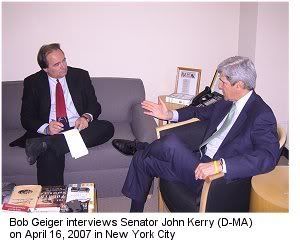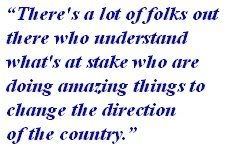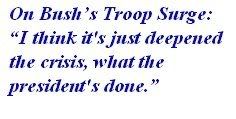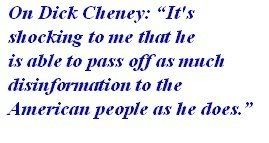My Conversation With John Kerry
 Senator John Kerry (D-MA) was in New York City on Monday to promote This Moment on Earth, the book on a new environmentalism that Kerry wrote with his wife, Teresa Heinz Kerry. The 2004 Democratic presidential nominee spent almost 30 minutes with me discussing his book and the factors that drove him to push for greater public recognition of the dangers caused by global climate change.
Senator John Kerry (D-MA) was in New York City on Monday to promote This Moment on Earth, the book on a new environmentalism that Kerry wrote with his wife, Teresa Heinz Kerry. The 2004 Democratic presidential nominee spent almost 30 minutes with me discussing his book and the factors that drove him to push for greater public recognition of the dangers caused by global climate change.We also touched on other issues including the Senate Judiciary Committee hearings this week on the Justice Department scandal, House Speaker Nancy Pelosi's trip to Syria, the Democratic drive to withdraw U.S. troops from the Iraqi civil war and why Dick Cheney just can't stop lying to the American people about Iraq and terrorism.
I met with the relaxed and friendly Senator Kerry before his appearance on The Colbert Report on Monday. Here, along with some audio clips, is that interview.
Bob Geiger: With the passion you have and the voice you've had on the Iraq war and issues like health care for all American children, what is it in the last two and a half years, since the presidential election, that prompted you to write this book, at this time?
John Kerry: During the campaign in '04, everywhere we went, I raised environmental issues, every state I went to, we did environment events, from clean coal technology in West Virginia to hog farms in Iowa to wind farms in Minnesota to coastal erosion in Louisiana, I mean, you name it. And people didn’t seem to connect the dots as much as we thought they should and at the end of the campaign there was a feeling somehow -- there was even an article written 'Is Environmentalism Dead?' -- and it was in response to that that we wanted to redefine that environmentalism has been shoved a little bit into a corner until recently and now it's beginning to break out again, thank heavens.
 But mostly, this was an effort to try to connect the dots for people, so they began to see environmentalism not as caring less about the economy and caring less about jobs and caring less about health about education and security -- they're all linked. And that environmentalism is those things and more. And we wanted to show people, other people around America who get it, who aren't your typical environmentalist -- like a Marine who's taking care of the rivers down in North Carolina or the rancher out in New Mexico who was a Bush organizer who's fighting to preserve her land.
But mostly, this was an effort to try to connect the dots for people, so they began to see environmentalism not as caring less about the economy and caring less about jobs and caring less about health about education and security -- they're all linked. And that environmentalism is those things and more. And we wanted to show people, other people around America who get it, who aren't your typical environmentalist -- like a Marine who's taking care of the rivers down in North Carolina or the rancher out in New Mexico who was a Bush organizer who's fighting to preserve her land.There's a lot of folks out there who understand what's at stake who are doing amazing things to change the direction of the country. We wanted people to know about it and see it and give a new sense of what it means to care about the environment.
Geiger: So in 2004 you mentioned the environment in almost every speech you gave on the campaign trail….
Kerry: There was no speech that I gave where I didn’t talk about energy independence, global climate change and the combined need to put our efforts into alternative and renewable fuels, all of them -- including my acceptance speech.
Geiger: But what do you think it is over the last year or two that kind of flipped the switch in the heads of a lot of Americans, that's made them start paying more attention to climate change and global warming?
Kerry: Well, several things. One, the issues are becoming more urgent and the media has begun to cover it with a greater sense of urgency. Two, Al Gore's movie obviously helped to penetrate the public consciousness in a very big way. And I think that had a lot of impact in helping shift the view on that issue and, three, locally there's sort of a critical mass beginning to gather again, like there was in 1970, where people are prepared to go out and try to make a difference.
Geiger: I think also the specter of category one hurricanes becoming category fives overnight and…
Kerry: Well, you know, you had four hurricanes the summer that we were running in '04, that kept me out of Florida… But I think the accumulation of all of that, the changes in weather systems locally, people just inherently know something's happened.
Geiger: Now, you say in the book that the people actually doing something to address global climate change and who are very active, you said that they're not "surrendering to pessimism and scare tactics." Approaching it from another angle, what do you say about Congressional Republicans like Senator Inhofe who say -- and I think you quote him in your book saying that it's all a hoax, that climate change is all a hoax.
What do you say about Congressional Republicans who say that and then as a follow-up, what do you say to Americans who get confused when they hear you, your wife, Vice President Gore talking about climate change and then they hear a United States Senator saying it's all BS?
Kerry: There have always been professional deniers, in our lives, in society. What we say to people is you've got to go look at the science yourself. Use your God-given talent and brain and thinking ability and just go look at the facts. Weigh the evidence. When you have 3,000 scientists from 130 countries, all of whom agree in 928 scientifically-reviewed studies that this is happening, versus one or two or three scientists who sort of raise some questions -- none of whom can undo the theory of global climate change. None of whom have a peer-reviewed study to refer to. You've got to put your measure of common sense against those things and that's what you ask people to do.
Geiger: And it seems like when we talked about taking back the Senate -- by a slim margin though it may be -- isn’t that where the change in committee chairmanships really makes a difference, having Senator Boxer as chair of that committee now?
Kerry: Oh, it makes a huge difference. Absolutely. She's a terrific champion for the environment, she's working hard… we can now call hearings, we can now have witnesses, where as we couldn’t before. You couldn't air this at all and have accountability. Now that we're able to do that, I think it’s beginning to change the information flow to people.
Geiger: What is it about the direct link between dependence on foreign oil and national security that the average American just doesn’t seem to get and what would you say to a group of those Americans who don’t make that connection if they were sitting with you right now?
Kerry: I'd look them in the eye and I'd say, how do you believe that being dependent on the Arabs nations for our oil, with the Middle East being as volatile as it is, transferring billions of your dollars to that part of the world -- and some of it to terrorists -- how does that make America safer?
It's a simple question and I think that people when they weigh that begin to see that being able to create jobs here in America, that create our energy here in America, that make us dependent on America for America's energy, makes you a stronger nation -- economically, in terms of health and our job base and the next generations and obviously that translates into security. If you're producing your own energy you're more secure.
Geiger: In This Moment on Earth you discuss the collision course that we're on with our physical health and climate change -- can you talk a little about the health affects of climate change, albeit from a non-physician's point of view?
Kerry: Climate change has already taken enormous numbers of lives… There were some 35,000 lives lost to the heat wave that we had in Europe last summer and in our country. It raises the pollution levels in the air, which increases the problems with asthma and those with emphysema and other lung deficiencies feel it more acutely as a consequence.
There's no question that six of the last 10 years have been the hottest years on record and 10 of the last 20, I think it is, have been the hottest years on record. Last year was the hottest year on record, so you're looking at a complete trend line that keeps threatening species, threatening air quality, threatening sea level rise, threatening crops and the movement of crops.
Certain diseases carried by bugs, the bugs with those diseases that used to die because of the temperature don’t and they flourish in places they didn’t before. I'll give you an example: In Sweden, they have an infestation of ticks -- ticks used to die, now the ticks are out there spreading disease. There's any number of ways that this all flows downstream.
Geiger: So you talk in the book about an Energy Plan and the first component of it is "reverse and stop emissions that cause global warming." What's the latest with your legislation, the Global Warming Pollution Reduction Act of 2007?
Kerry: We're having a series of hearings in several committees, the Energy Committee with Senator Bingaman, the Environment and Public Works Committee, Senator Boxer, the Commerce Committee, myself and Senator Inouye… We're holding those hearings now and focusing on a cap on carbon, you've got to put a price on carbon.
If you put a price on carbon, then we can begin to reduce the amount of carbon dioxide emissions in the air. There are three keys: Number one is energy efficiency -- we've gotta get more energy efficiency in America, there's all kinds of ways to do it, solar, wind, alternative, renewable… You design buildings more effectively, there's any number of things we can do.
The second thing we've got to do is create more alternative energy supplies for Americans, so they can go fill up their cars and use a fuel that doesn't send the same kind of carbon into the atmosphere. And third, clean coal technology. We have a lot of coal-fired power plants in America, we have a lot of coal in America, we need to produce power for the future and the key is to make sure that coal burns clean.
 Geiger: I'd like to ask you some questions on non-environmental issues…
Geiger: I'd like to ask you some questions on non-environmental issues…Kerry: Go right ahead… We'll cover whatever you want to cover.
Geiger: You're not on the Senate Judiciary Committee, but working as closely as you do with Senator Kennedy and Senator Feingold, how do you see the hearings going tomorrow with Attorney General Gonzales?
Kerry: I think he's got a lot of explaining to do and I think that if the homework has been done correctly, as I suspect it has, he's going to have a hard time doing that.
Geiger: On the Pelosi trip to Syria… Can you comment further on the kind of heat Speaker Pelosi took from Republicans for her trip to Syria, that was even more than was lobbed at you and Senator Dodd when you went there last year…
Kerry: I think it was appropriate for her to go. I think this is a lot of fuss over nothing and the administration certainly has a right to say it has a different policy but they ought to embrace her going over and say "look, if you learn something important, tell us." Why be so defensive about it?
Geiger: Why are they so defensive when they're so chronically stubborn and lazy about diplomacy themselves?
Kerry: Yeah..
Geiger: And attack Speaker Pelosi when she picks up that ball…
Kerry: I think it was entirely appropriate for her to go, find the facts, find out what's going on, listen carefully and get a sense for what the possibilities are for American policy. And that is a Congressional responsibility and it's just fine.
Geiger: Along with Senator Dodd, you were the first to step up to the plate on the Feingold-Reid bill… I'm wondering what your comment is on what a lot of us in the Progressive media see as a disheartening lack of spine on the part of some of your colleagues -- and that's the way we see it -- some of your colleagues in the House and the Senate and them not being willing to stand up and support it as you have and Senator Dodd has and Senator Sanders has. Are they waiting for more than two-thirds of the American people to agree with them?
 Kerry: I can't speak for my colleagues. You'll have to ask them why. I'm doing it because I believe it is the right thing to change the financing. This is not a cut-off that somehow injures our troops. This changes what we're spending for. This means we're not spending to send our troops door-to-door to do missions that create more problems.
Kerry: I can't speak for my colleagues. You'll have to ask them why. I'm doing it because I believe it is the right thing to change the financing. This is not a cut-off that somehow injures our troops. This changes what we're spending for. This means we're not spending to send our troops door-to-door to do missions that create more problems.It means we're going to spend to help train and finish training the Iraqis. It means we're going to spend to chase al-Qaeda. And we don’t need to have the escalation of this war, which has brought more violence, more Americans dead, and certainly no great progress on the political side. I think it's just deepened the crisis, what the president's done. There's nothing more important to speak your mind on than war.
Geiger: What can we tell Democrats who continue to argue in Republican talking points by saying that they will not vote for any bill that cuts off funding to the troops, instead of re-framing it as cutting off funding for this disastrous war?
Kerry: Well it's not even cutting funding -- it’s changing what you're spending money for. People like to say cutting money for the war but that just plays into their hands. It's not cutting funding. It's changing what the money is for -- it's spending money for a more intelligent mission. The mission is to complete the training of Iraqis, to chase al-Qaeda, to protect American forces and draw down our troops. We're spending to reposition and redeploy and that is a smarter way to resolve what is happening in Iraq today.
Geiger: I cover the Senate pretty closely. I understand the way it works, I understand the way things are said. How does a Democratic Senator balance the need for civility and consensus building and at the same time address a constituency that's angry and that doesn't want to reach across the aisle?
Kerry: You have to honor the constituency -- any constituency. I honor peoples' point of view and respect what they're saying but try to channel the anger and frustration into a constructive way of getting something done. I understand the anger -- I share a lot of it. But what we have to do is persuade some of our colleagues to come over to a different place. Politics is the art of the possible and so you have to change opinions. I applaud what the grassroots is doing because the grassroots is helping to change opinions and helping to change peoples' sense of what's possible. And we have to keep doing it.
Remember, last year when I brought the amendment to the floor of the Senate, in the summer of '06, that set a date for withdrawal, I got 13 votes. And I got a nice front-page story in the New York Times vilifying me, through my colleagues, for even bringing the subject up. Well, guess what? Three months later, the closing argument for the Democratic party in the elections, was Iraq. And within a year, we had 48 votes and then 50 -- to do exactly what I'd suggested. I think it is the right position.
It was the right position then, it's the right position now. It has to be -- it's not in a vacuum. And it's very important to write about it as not being in a vacuum. It is done in the context of serious diplomacy that gets you a leveraged change in the regional security arrangement. That's critical to the United States being withdrawn -- I don’t just say leave chaos. I'm not just saying abandon. If you read the full measure of the proposal, it is, in fact a change in why we're deployed and what we're trying to do with that deployment, how we get our troops out and what we ought to be doing. That's what it is.
Geiger: Senator, why does Dick Cheney keep telling the same lies over and over again about Iraq and the substance of what the war on terror is?
 Kerry: I can't figure out Dick Cheney. You'll have to ask Dick Cheney why he keeps telling those…
Kerry: I can't figure out Dick Cheney. You'll have to ask Dick Cheney why he keeps telling those…Geiger: He won’t talk to me.
Kerry: Well, somebody has to ask him that. It's shocking to me that he is able to pass off as much disinformation to the American people as he does and as he has. From his insurgency in its last throes, to his insistence about al-Qaeda and other things, he simply has not, I think, told the American people the truth about this war.
Geiger: Last question: Apparently you said something in Denver that has the blogosphere buzzing about you possibly getting into the presidential race…
Kerry: No. What I said is the same thing I've said previously which is, in answer to a question "are you ever going to run for president again -- will you run?" I said you never say never. I've said that I don’t know what comes in the future and it's possible things change and I might end up doing it. But I have not put that in the context of now and this race. I've said I'm running for reelection, I don’t think this is the right time. That's the decision I've made and resting with it.

















<< Home